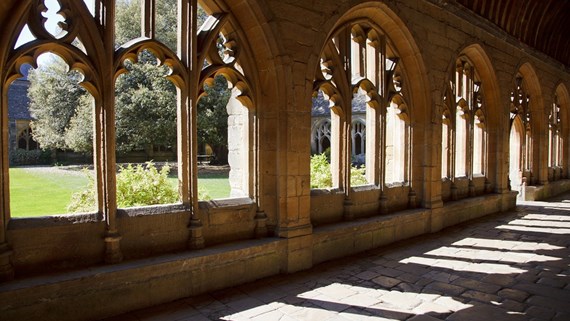The Charities Act 2022: changes to the Universities and Colleges Estates Act
Insight

This article is one of a series of articles focusing on some of the more technical changes envisaged by the Charities Act 2022 (the Act), which was passed in February 2022. This series is intended to provide a helpful resource in considering these changes and their implications for you and your charity.
What’s changing?
- The detailed provisions in the Universities and Colleges Estates Act 1925 (the UCEA 1925) are being repealed.
- The institutions to which the UCEA 1925 applies are being given the general powers of an owner of land.
- The exercise of this replacement power will not, of itself, engage the exception from the Part 7 advice requirements in section 117(3)(a) Charities Act 2011 (as amended by the Act) (the Part 7 requirements).
- According to the updated implementation plan, the merger provisions of the Act will be brought into force by the end of 2023.
Why is it important?
The changes remove the complex and technical arrangements that apply under the UCEA 1925 and replace them with a simpler regime: a new general land transaction power. In practice, the UCEA 1925 was largely defunct and so this repeal of an anachronistic set of requirements is welcome. However, over the years the institutions to which the UCEA 1925 applies will have developed their own processes for complying with its requirements and so may need to give thought to how these processes may now need to be updated.
Who needs to think about it?
These changes only apply to the Universities of Oxford, Cambridge and Durham (the Universities); the colleges and halls of those universities (the Colleges); Eton and Winchester Colleges (Eton and Winchester).
What’s changing (in detail)
The regime in Part 7 of the Charities Act 2011 does not currently apply to dispositions and mortgages “for which the authorisation of the Secretary of State is required under the Universities and Colleges Estates Act 1925” (s117(3)(b) and s124(9)(b) Charities Act 2011).
The Law Commission identified this in its original consultation as “the UCEA exception”. A full summary of the historical background to the UCEA 1925 can be found in the Law Commission’s consultation and final report.
In practice, this has meant that:
The Universities and the Colleges have been able to dispose of or mortgage property by relying on either:
- a power in their governing documents, or
- the powers listed in the UCEA 1925, or
- the general power conferred on them by s21 UCEA 1925 and Ministerial consent to the exercise of this general power.
The Universities have not been required to comply with the Part 7 requirements by virtue of their status as exempt charities (s117(4)(a) and s124(10) Charities Act 2011).
The Colleges have not been required to comply with the Part 7 requirements because either:
- the transaction has been effected using the general power and Ministerial consent has been obtained,
- the transaction has been effected using a listed power for which Ministerial consent is not required, or
- the transaction has been effected using a power in their governing documents which has brought them within the ambit of s117(3)(a) Charities Act 2011; namely that the power is given by a statutory provision contained in or having effect under an Act, or is given by a scheme (the s117(3)(a) exception).
Eton and Winchester have been able to dispose of or mortgage property by relying on various combinations of powers and consents and have generally not been required to comply with the Part 7 requirements.
How useful are the changes likely to be?
In the near-century since the UCEA 1925 was enacted, the attitude towards active regulation of charities has substantially shifted. At the time, these institutions could do very little without Parliamentary or Ministerial oversight. As the general direction of regulation has moved towards a much more permissive regime, in which trustees bear the responsibility for compliance, it makes sense for the prescriptive requirements of the UCEA 1925 to be removed.
The effect of the changes (once enacted) will be that when disposing of or mortgaging land the Universities, the Colleges and Eton and Winchester will be able to rely on a power in their governing documents or the new general power set out in s1A UCEA 1925, which gives them, in relation to land belonging to them, all the powers of an absolute owner. Ministerial consent will not be required to such a disposal or mortgage.
Over the years, many of the institutions concerned will have developed their own processes to ensure compliance with the complexities of the UCEA 1925 requirements. Some of the institutions will have considered the interaction of the UCEA 1925 with the Part 7 requirements, but others will not previously have had cause to do so. It may be that processes that have been followed in reliance on powers under the UCEA 1925 will need to be reviewed.
Compliance with the Part 7 requirements (as amended)
The effect of the changes in terms of the extent to which each institution will need to comply with the Part 7 requirements will vary. At the point of writing it appears that:
- The Universities will continue to be exempt from the Part 7 requirements by virtue of their status as exempt charities. They will continue to be required to state in an instrument concerning a disposition of land that the land is held by or in trust for a charity and that they are an exempt charity (s122(2) Charities Act 2011, as amended by s23(2) of the Act).
- The position of the Colleges will depend on the power on which they are relying to make the disposal. If the Colleges rely on the new general power under s1A UCEA 1925 to effect a disposal or mortgage they will be required to comply with the Part 7 requirements. However, if the Colleges rely on a power in their statutes they will come within the s117(3)(a) exception because their statutes were made under an Act of Parliament. They will continue to be required to make the relevant s122(2) Charities Act 2011 statements, as amended by s23(2) of the Act.
- The position of Eton and Winchester mirrors that of the Colleges.
One particular issue that affected institutions may want to consider is how a transaction which would historically have been effected under one of the listed powers can now be effected – and whether this will bring the institution within the Part 7 requirements. If so, there may be cost and timing considerations to be factored in.
Universities and Colleges will also wish to take note of the new section 117(1A). This introduces into the Part 7 regime a welcome clarification, namely that when there is a disposal of land the charity holds for the benefit of others as well as itself, the Part 7 requirements do not apply. This was introduced primarily to assist charities acting as executors to know what to do when selling land, the proceeds of which would be distributed for beneficiaries of an estate other than the charity. However, and depending very much upon how they have been set up, the same exception may now apply to some joint equity schemes run to enable teachers and lecturers to live close to their institution.
Practical next steps
For the Universities: identify where a transaction would historically have been effected under a listed power or the general power with Ministerial consent. Once the changes have been brought into force, such transactions will need to be effected under the power in s1A Universities and Colleges Estates Act 1925. Process guides and approvals documentation will need to be updated. Universities may also wish to review their constitutional documents to see if any references to the UCEA 1925 will be redundant or unhelpful.
For the Colleges:
- consider which transactions can be effected under a power in their statutes such that the s117(a)(3) exception will apply,
- identify which transactions will need to be effected under the new general power in s1A UCEA 1925 and any costs or timings implications of the requirement to comply with Part 7,
- update process guides and approvals documentation and establish whether any additional approvals are likely to be necessary,
- review constitutional documents to see if any references to the UCEA 1925 will be redundant or unhelpful, and
- familiarise themselves with the requirements of the amended Part 7.
If you require further information about anything covered in this briefing, please contact Julian Smith, Sara van der Pas, or your usual contact at the firm on +44 (0)20 3375 7000.
This publication is a general summary of the law. It should not replace legal advice tailored to your specific circumstances.
© Farrer & Co LLP, November 2022







